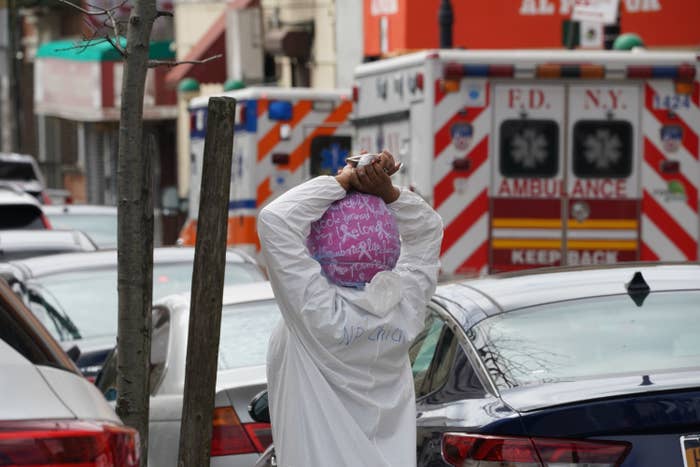
The journalists at BuzzFeed News are proud to bring you trustworthy and relevant reporting about the coronavirus. To help keep this news free, become a member and sign up for our newsletter, Outbreak Today.
Hundreds of doctors and a civil rights group are calling for the federal health department to release race and ethnicity breakdowns of COVID-19 data to identify and track potential disparities in how the coronavirus crisis is affecting different communities.
“This Administration’s alarming lack of transparency and data is preventing public health officials from understanding the full impact of this pandemic on Black communities and other communities of color,” the group, which includes the Lawyers’ Committee for Civil Rights Under Law and doctors from around the country, wrote in a letter to Health and Human Services Secretary Alex Azar on Monday.
“We are concerned that Black communities are being disproportionately impacted by the pandemic, and have lower access to COVID-19 testing which may cause delayed care, an increased risk of high mortality rates, and the acceleration of the spread of the disease in our communities,” they wrote in the letter. “The U.S. Department of Health and Human Services and its sub-agencies are charged with ensuring that racial disparities do not persist in the administration of healthcare services, even in a pandemic.”
The Centers for Disease Control and Prevention did not immediately respond to a request for comment.
A group of black doctors in Virginia first raised these concerns weeks ago, and have since been calling for state and federal authorities to release data on who is getting sick and dying. The group is also calling for state and municipal authorities across the country to release race and ethnicity data.
“We understand that this data is being collected [by the federal government] and not being reported out to the public, and we believe they need to do their part in pressing state and local health departments to do the same,” Kristen Clarke, president of the Lawyers’ Committee, said on a call with reporters.
The CDC’s COVID-19 reporting form requires information on patients’ race and ethnicity, meaning reports of COVID-19 diagnoses and deaths reported to federal authorities from state and local health departments must include that data.
"Black Americans face insurmountable barriers to testing and treatment for COVID-19," the letter reads. "Private COVID-19 testing is costly, and government-administered testing is severely restricted. These barriers are exacerbated by the fact that racial minorities are suddenly uninsured, as they are overrepresented in recently shuttered industries, such as travel, retail, restaurant and hospitality."
Clarke said there is “some data which suggests that this crisis is in fact having a disparate impact on African Americans,” referring to reports that have been made available by the Illinois Department of Health and a few other local jurisdictions around the country. Those reports have shown severe disparities in the numbers of black people contracting and dying of COVID-19.
The Illinois data shows that 29.4% of confirmed cases of COVID-19 in the state are black residents, and black people account for 41.2% of COVID-19 deaths in the state. Black people account for just 14% of the state’s population.
"I have seen in my waiting rooms, in my exam rooms, mostly black and brown patients who are essential workers and service workers who cannot afford to stay home," Uché Blackstock, an emergency room doctor in Brooklyn and CEO of Advancing Health Equity, said on the press call.
She said that the data is essential because it could change how authorities deal with the public health crisis, including directing resources to the communities and parts of the country most urgently in need.
“In the past, the CDC has tracked those types of data, demographic, race, and ethnicity data for other virulent outbreaks, and they’ve typically released that kind of data in the past, but they’re not doing so for COVID-19,” said Dariely Rodriguez, director of the Lawyers’ Committee’s Economic Justice Project.
The short supply of testing in the US is one major concern for Dr. Taison Bell, an assistant professor at the University of Virginia's infectious disease and pulmonary critical care division, who said, “early and aggressive testing allows us all to stay safe.”
“We see in states that aren’t reporting on racial demographics that there’s been a surge of patients dying of respiratory diseases … These are conditions caused by COVID-19,” Bell said, adding that preexisting conditions that make COVID-19 more fatal, like asthma, diabetes, and heart disease, are also more prevalent in black communities.
